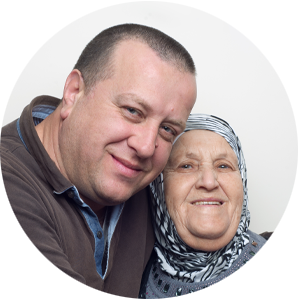What you need to know about getting presbyopia treatment in Brooklyn and Manhattan
Presbyopia explained
In these toggles we explain what you need to know about presbyopia
Presbyopia is a vision disorder that occurs as you age. It specifically affects the eye’s ability to focus on near objects.
It affects everyone and typically develops between the ages of 20 and 50.
Common symptoms include:
- Eyestrain or headaches after reading or doing close work
- Difficulty reading the small print
- Fatigue from doing close work
- The need for brighter lighting when reading or doing close work
- The need to work or read at a greater distance to focus properly
Presbyopia occurs when the lens of your eye begins to harden as you age. As your lens loses it’s elasticity; it loses the ability to focus on close-up objects.
We can detect presbyopia by performing a comprehensive eye examination which includes a refraction assessment and an eye health exam.
The most effective way of treating presbyopia if you wish to remain free of glasses and contact lenses is with refractive surgery or corneal inlays.
Refractive surgery
- Conductive keratoplasty
- LASIK – This is the most common form of laser eye surgery and is suitable for over 90% of patients.
- LASEK
- PRK
Lens implants
This procedure involves removing the lens in each eye and replacing it with a synthetic lens.
Corneal inlays
This involves inserting a small plastic ring with a central opening, into the cornea of one eye.
Could you be a suitable candidate for laser eye surgery?
The best way to correct refractive errors and get freedom from glasses and contact lenses
How to get help
These 3 easy steps allow you to stop worrying about your eyes
STEP 1:
Call us to get an appointment
Give us a call at (718) 630-1010 and we’ll answer the questions you have so that we can recommend the best next step.
STEP 2:
Visit us
Whatever the issue, we’ll provide you with the exceptional care that your most precious sense deserves.
STEP 3:
Get the help you need
Whether it’s a quick intervention or a long-term treatment plan, we’ll guide you with compassion, every step of the way.
Affiliations and memberships
We are proud to be associated with these professional organisations
Discover your options to get your eyes back in top shape
Call us and we’ll help you take the steps you need to repair your eyes
What our patients say
★★★★★
We’ve been getting 5-star reviews from savvy Brooklynites and New Yorkers for over 20 years


Dr.Khosrof is one of the most knowledgeable doctors in his field. My family and I have been his patients for years and he has never failed to provide us tip top service and always does what’s safest for us and our eyes…


I want to talk about Dr. Samer, he is extremely professional and kind and he has the latest equipment and great staff. He’s very caring about his patients and takes the time to explain.


Dr. Khosrof is an outstanding physician and surgeon with a great bedside manner. As a fellow Ophthalmologist, I have always been impressed by his talent.


Dr. Khosrof improved my eye sight from 20/400 to 20/80. I had previously see 2 other retina specialists and 1 optometrist and none of them were able to help me. He’s terrific!
About the expert
Dr. Samer Khosrof | Ophthalmologist
Dr. Samer Khosrof is a top eye surgeon in New York City with over 25 years of experience treating complex eye conditions such as diabetic retinopathy and age-related eye conditions.
His extensive experience enables him to stay on top of the latest treatments available. He believes in the efficacy of medical technology and has the expertise to deploy the newest diagnostic and treatment techniques to treat his patients with 100% confidence.
When you become a New York Eye & Retina Clinic patient; you’re a Samer Khosrof patient first. This means he sees you before your surgery, he performs your surgery, and he provides your aftercare. In the end, you’re his patient, and he takes that responsibility very seriously.
































